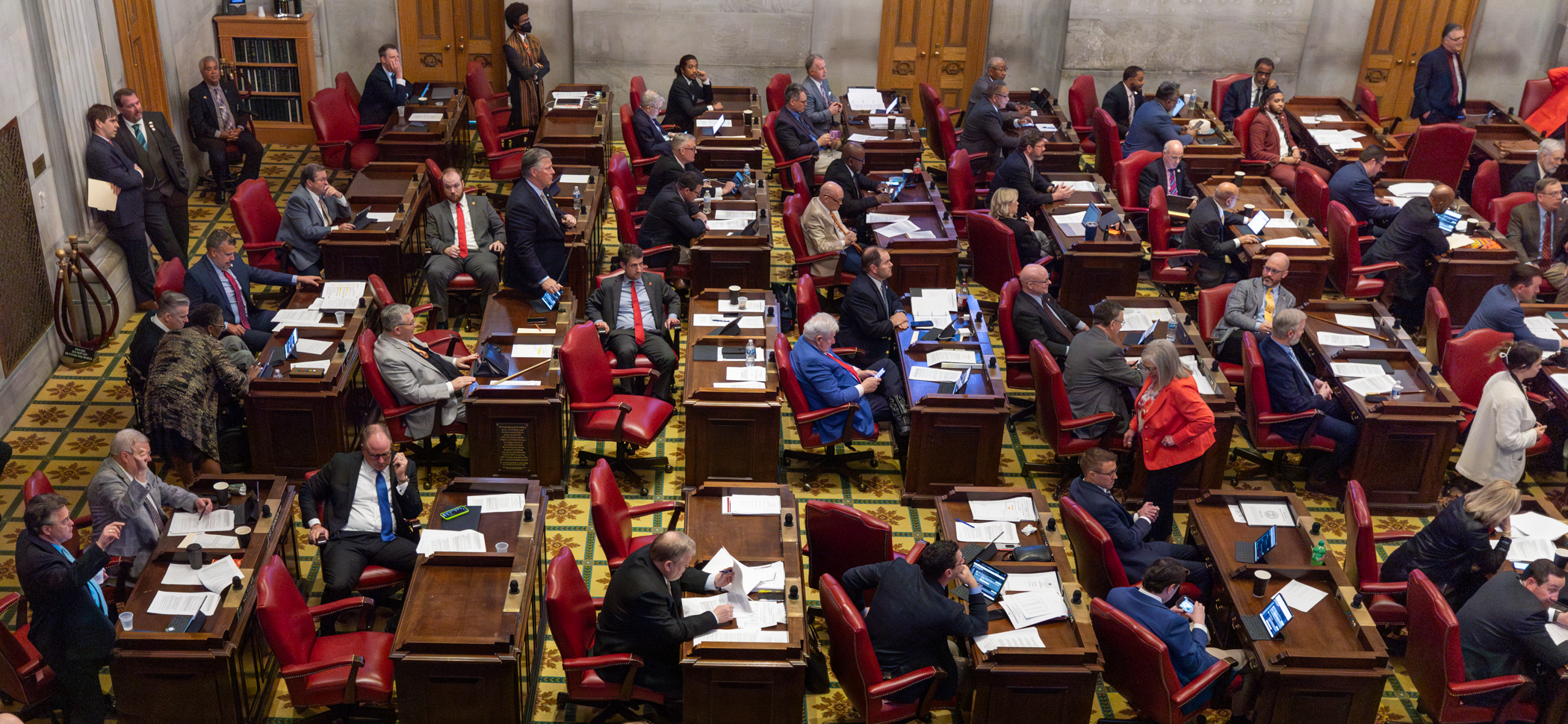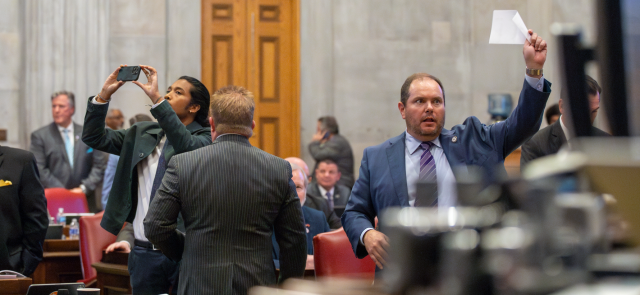Stay ahead of the curve as a political insider with deep policy analysis, daily briefings and policy-shaping tools.
Request a DemoHouse, Senate war over franchise tax refunds expected to go to conference

Lawmakers attend a House floor session on March 25, 2024. (Credit: Erik Schelzig)
The dispute between House and Senate Republicans over details in a $1.55 billion franchise tax refund bill for companies doing business in Tennessee is expected to go to a conference committee in hopes of ironing out so-far intractable differences between the chambers.
Republican Gov. Bill Lee, administration officials and upper-chamber Republicans say the changes are a must-do, arguing the state is at significant legal risk from a threatened lawsuit from a Philadelphia-based law firm representing 80 businesses over the 0.25% tax on in-state business income and property.
The firm cited a 2015 U.S. Supreme Court ruling in a case raising the issue of the “dormant” Commerce Clause, designed to prevent states from adopting protectionist measures. The tax has been on Tennessee’s books since 1935 and was last revised in 1937. As many as 100,000 companies doing business here pay the tax
Senate Republican Caucus Chair Ken Yager moved Thursday to non-concur with the version of the bill passed by the House earlier this week.. It contains provisions requiring disclosure of companies names and refund dollar amounts. It also limits the total amount of rebates to $700 million for one year.
The Senate’s version goes along with Lee’s recommendation, providing the $1.55 billion in rebates over a three-year period, which is the look-back process for companies to change their tax returns.
The governor has declined to say his family owned home services and construction company, now in a blind trust, would likely be impacted.
Provisions in the bill would result in a $400 million cut in the tax going forward. The current 0.25% tax requires companies to pay the higher value of property value located within the state or its apportioned net worth. The bill would eliminate the apportioned net worth provision.
“Shaming process”
Tennessee Chamber of Commerce CEO Bradley Jackson urged House GOP leaders to go along with the fix.
“We do have concerns with the disclosure,” Jackson said.
If the businesses’ names and exact refund amounts are disclosed publicly, “a competitor could go in and look at your property and compare that with your net worth. They basically could figure out your total operations here,” Jackson added. “They could back into the numbers.”
Taxpayer information has traditionally been held confidential in the state.
“We just don’t want it to be like kind of a shaming process where if you get this. Because they paid the tax. They already paid it,” Jackson said.
Jim Brown, the Tennessee director for the National Federation of Independent Business agreed with Jackson and Lee’s concerns over the House version.
“We feel that could invite legal action, the one year versus the three year — every state around us has three years,” he said. “The IRS has three years on statute-of-limitations on refunds. No one is less than that that we know of. We did some research on that and we would be the first state to have only a one-year refund and still allow the Department of Revenue to go back three years and audit you,” Brown said.
Brown said the issue “caught the attention” of the Tennessee Society of CPA, who have sent out an alert to their members.
House Republican leader William Lamberth of Portland said companies always have the option of choosing not to accept the refunds. House members feel “very strongly on the transparency” provision in their bill.
Senate Republican leader Jack Johnson of Franklin said Wednesday evening “we’re not totally comfortable with everything they had. I think we’re close but there’s still a couple of provisions we need to negotiate.”
He said that includes how far back the provisions go, one year or three-to-four years. The other issue is the public release of information.
“Some of my colleagues have concerns about proprietary taxpayer information,” Johnson said. “Obviously that’s something that’s generally held very, very confidentially. And it should be. I think we need to have more conversations.”
Johnson said the Senate early on discussed the issue with state Attorney General Jonathan Skrmetti. Johnson said Skrmetti provided guidance who felt “it protected us in the best manner possible.”
Public records bill dropped in House as retribution for failure of unrelated measure
In the waning days of Tennessee lawmakers’ annual session last week, Senate Judiciary Committee Chair Todd Gardenhire got a bill passed unanimously in the upper chamber to prevent non-governmental third parties from intervening in public record lawsuits. But the sponsor of the companion bill decided against taking up the measure on the last day the …
ACLU calls for Gov. Lee to veto for ‘unworkably vague’ abortion trafficking bill
The American Civil Liberties Union of Tennessee is urging Republican Gov. Bill Lee to veto an “abortion trafficking” bill that makes it a crime for anyone who “recruits, harbors or transports” a minor out-of-state to obtain an abortion without the consent of a parent or legal guardian. “We need to protect the rights and well-being …
Clear skies ahead? Tennessee governor signs ‘chemtrails’ ban into law
Republican Gov. Bill Lee has quietly signed a bill into law that sponsors say will prohibit the deployment of “chemtrails” over Tennessee. Officially, the measure sponsored by Rep. Monty Fritts, R-Kingston, and Sen. Steve Southerland, R-Morrison, is targeted at banning “geoengineering experiments by intentionally dispersing chemicals into the atmosphere.” But sponsors privately said the bill …
Boro Grand Prix? IndyCar season finale’s move from downtown Nashville roils teams, sponsors
The Music City Grand Prix’s retreat to a racing oval in Wilson County is leaving many racing fans, teams and sponsors nonplussed. Unveiled to great fanfare as the season-ending event on the streets of Nashville, the event is instead being held at the Gladeville facility about 35 miles from downtown Nashville — or about 15 …




